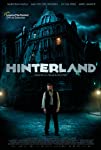Eye For Film >> Movies >> Hinterland (2021) Film Review
Hinterland
Reviewed by: Jennie Kermode

There are new films about the Second World War in cinemas at least monthly, yet the First World War, which arguably had a much more disruptive effect on the world as it had been understood, and which set the stage for a century of conflict, is rarely covered in cinema at all. Perhaps most important in relation to the bigger historical picture is its aftermath, and that’s where Hinterland begins, with a group of Austrian soldiers who might have hoped to return home as heroes floating back to a ruined Vienna on what feels like a funeral barge, there to be summarily discharged and left uncertain what to do.
It does not take long to establish that this is very far from home as they remember it. When Peter (Murathan Muslu), until recently a lieutenant, arrives at his former abode, only the housekeeper is there to report that his wife and child , finding life too hard in the city and not knowing if he was dead, went to stay with relatives in the countryside in Gumpoldskirchen, where at least they still have food. Though he longs to reconnect with them, Peter is troubled by nightmares and flashbacks to his time in the war, and does not feel ready. He struggles to fit into what has become a hostile, resentful society, uncertain of his place until he finds himself snapped back into an old role by a fresh, unexpected horror: the violent murder of one of his soldiers.
What follows is a police investigation into a serial killer whose motive and methods of murder are grotesque and yet proportionate to the era. Nothing else is in proportion. Shot in the style of Sky Captain or The Wanting Mare, with backdrops which hark back to early German expressionism, looking for all the world like a Robert Wiene or FW Murnau set, Hinterland is a visual treat. Cinematographer Benedict Neuenfels combines Dutch camera angles with a curious lighting effects which make the actors look almost two dimensional, like graphic novel characters, whilst imbuing them with the ghostly beauty of the silent era.
This does nothing to hamper the excellent cast, who capture their classic archetypes perfectly yet still deliver performances with a human dimension. Muslu makes Peter strong yet brittle, prone to outbursts of self-destructive violence, yet with a lonely, haunted quality which reveals the ghost of the accomplished detective he used to be. The chemistry sizzles between him and Liv Lisa Fries, who plays Theresa, a young doctor who has taken advantage of the war to get promoted to chief medical officer in the police force where she long admired his work. Determined to cling to her new found independence despite colleagues’ hopes that women will be put back in their place, Theresa is not looking for love, and she knows that he needs something else, yet the tenderness which develops between them, together with her persistent optimism, forms a bright spark in a dark world.
The film makes frequent use of theatrical devices. Peter’s nightmares are conveyed through sound and shadows on the walls behind the bed. Sometimes the camera swings smoothly round to change the tone of a scene, leaving characters suddenly alone or dwarfed by tall buildings. A sequence in which the killer stalks a victim through a tunnel recalls the Fritz Lang classic M. Each crime scene is elegantly staged. The final sequence, in a bell tower, has any number of reference points, yet director Stefan Ruzowitzky makes it his own, using Muslu’s physical bulk to redefine the space, finding vulnerabilities in his limited capacity to manoeuvre and the danger of him falling through the ancient, straining beams.
At times all this style can overwhelm the substance, but there’s a strong story here with layers of additional thematic weight. Theresa’s presence, and an encounter with an artist who is pretty open about being gay, hint at the liberal climate which will briefly flourish in the years to come, and the cultural awakening which will accompany it. Other characters are exhausted by poverty, however, and resent the Jewish refugees from the east whom they blame for every kind of shortage. It is a particularly difficult time for the disappointed soldiers, many of whom have lost their families and homes. One shows Peter a leaflet, telling him that it’s from the National Socialists, who are the only ones who care about people like him.
The mood here recalls Alan Moore’s From Hell (the graphic novel, not the very different film). Ruzowitzky likewise uses serial murder as a microcosmic mirror of a bleak future, with a killer who seems to possess a similar instinct for the deep wrongness of the world around him. Peter shambles through it like Moore’s troubled detective as strangers push up against him, offering to sell him looted silver or enslaved children. A personal betrayal leaves him reeling – and yet there remains, through it all, a slender thread of hope. Many historians have reflected that in truth the First World War never did end, just took a breath before morphing into the Second. In that quiet moment, that calm at the centre of the storm, one man might find a kind of peace.
Reviewed on: 06 Oct 2022

















